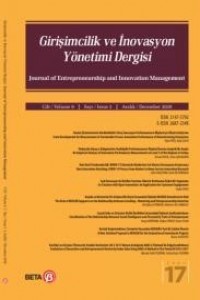Girişimcilikte Sosyal Engeller Ölçeğinin Geliştirilmesi ve Kontrol Odağı, Girişimcilik Niyeti ile İlişkisi
Amaç: Bu araştırmada girişimcilikte sosyal engeller ölçeğinin geliştirilmesi ve bu ölçeğin kontrol odağı ve girişimcilik niyeti ile ilişkisinin incelenmesi amaçlanmıştır. Yöntem: Çalışmada karma yöntem kullanılmıştır. Karma yöntem desenlerinden ise keşfedici sıralı desen benimsenmiştir. Araştırmanın nitel kısmında iki odak gurup (toplam 12 kişi) görüşmesi yapılmış, nicel kısmında ise 631 üniversite öğrencisinden anket yöntemiyle veri toplanmıştır. Nitel yöntemde MaxQDA programı, nicel yöntemde ise Smart PLS programı üzerinden analizler gerçekleştirilmiştir. Bulgular: Araştırmada yeterli güvenirliğe ve geçerliğe sahip dört ifadeden oluşan Girişimcilikte Sosyal Engeller Ölçeği geliştirilmiştir. Ayrıca Girişimcilikte Sosyal Engeller ile Kontrol Odağı arasında pozitif yönlü, doğrusal ve anlamlı ilişki tespit edilmiştir. Yani sosyal engellere kapılan girişimci adaylarının dış kontrol odaklı davranışı benimsedikleri söylenebilmektedir. Yine Girişimcilikte Sosyal Engeller ile Girişimcilik Niyeti arasında negatif yönlü, doğrusal ve anlamlı ilişki tespit edilmiştir. Buna göre girişimci sosyal engellere dair algısı yükseldikçe girişimci olmaya yönlenmekten geri durmaktadır. Sonuç ve Öneriler: Girişimcilikte sosyal engellerin önemli bir değişken olduğu ve girişimcilikle ilgili diğer değişkenlerle ilişkisinin bulunduğu görülmektedir. Ölçeğin arkadaş ve aile gibi farklı boyutlarda da incelenmesi ve farklı değişkenlerle ilişkisinin araştırılması önerilmektedir. Özgün Değer: Bu çalışma; literatürde rastlanmayan, hem sosyal engeller boyutu hem de girişimcilik özelinde bir ölçeği ortaya koymaktadır. Bu ölçek ile girişimcilerin daha önce araştırılmayan sosyal ilişkilerine dair yeni bulgular ortaya koyabileceği düşünülmektedir.
Anahtar Kelimeler:
Girişimcilikte Sosyal Engeller, Kontrol Odağı, Girişimcilik Niyeti, Ölçek Geliştirme
Developing the Scale of Social Barriers in Entrepreneurship and Its Relationship with Locus of Control, Entrepreneurial Intention
Purpose: In this study, it was aimed to develop the scale of social barriers in entrepreneurship and to examine the relationship of this scale with locus of control and entrepreneurial intention. Method: Mixed method was used in the study. The exploratory sequential design was adopted from the mixed method designs. In the qualitative part of the study, two focus group interviews (12 people in total) were conducted, and in the quantitative part, data were collected from 631 university students by questionnaire method. Analyzes were carried out using the MaxQDA program in the qualitative method and the Smart PLS program in the quantitative method. Findings: In the study, the Social Barriers in Entrepreneurship Scale, which consists of four statements with sufficient reliability and validity, was developed. In addition, a positive, linear and significant relationship was determined between Social Barriers in Entrepreneurship and Locus of Control. In other words, it can be said that entrepreneurial candidates who have social barriers adopt external control-oriented behavior. Again, a negative, linear and significant relationship was found between Social Barriers in Entrepreneurship and Entrepreneurial Intention. Accordingly, as the entrepreneur's perception of social barriers increases, he refrains from being an entrepreneur. Practical Impşications: It is seen that social barriers are an important variable in entrepreneurship and are related to other variables related to entrepreneurship. It is recommended to examine the scale in different dimensions such as friends and family and to investigate its relationship with different variables. Originality: This study; It reveals a scale that is not found in the literature, both in terms of social barriers and entrepreneurship. It is thought that this scale can reveal new findings about the social relations of entrepreneurs that have not been investigated before.
Keywords:
Social Barriers in Entrepreneurship, Locus of Control, Entrepreneurial Intention, Scale Development,
___
- Ab Hamid, M., Sami, W., & Sidek, M. M. (2017). Discriminant validity assessment: Use of Fornell & Larcker criterion versus HTMT criterion. Journal of Physics: Conference Series,
- ISSN: 2147-5792
- Başlangıç: 2012
- Yayıncı: Beta Basım Yayım Dağıtım A.Ş.
